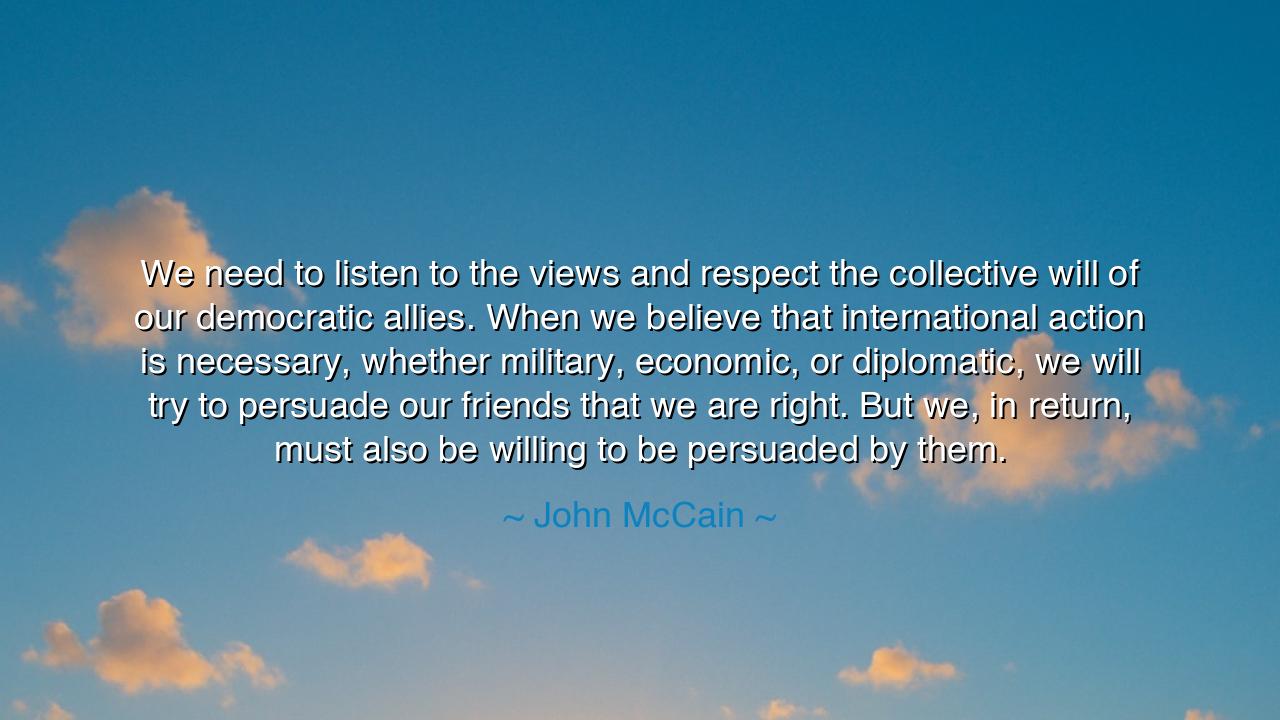
We need to listen to the views and respect the collective will of
We need to listen to the views and respect the collective will of our democratic allies. When we believe that international action is necessary, whether military, economic, or diplomatic, we will try to persuade our friends that we are right. But we, in return, must also be willing to be persuaded by them.






"We need to listen to the views and respect the collective will of our democratic allies. When we believe that international action is necessary, whether military, economic, or diplomatic, we will try to persuade our friends that we are right. But we, in return, must also be willing to be persuaded by them." — John McCain
Hear, O children of freedom, the voice of John McCain, a warrior and statesman whose heart bore both the scars of battle and the weight of conscience. In these words, he speaks not of conquest, but of humility, of the sacred duty that binds nations joined in the covenant of democracy. His call is to listen, to respect, and to be persuaded — virtues that are as ancient as the art of peace itself. For McCain understood what many forget: that power without wisdom breeds arrogance, and that unity among allies is not born from dominance, but from mutual respect and the willingness to learn from one another.
The meaning of this teaching is profound. When McCain speaks of the “collective will of our democratic allies,” he invokes the spirit of partnership — a brotherhood of nations forged not by coercion, but by shared belief in liberty, justice, and human dignity. He reminds us that true leadership does not command, it consults; it does not impose, it persuades. To listen to allies is to acknowledge that the wisdom of the world is not held by one nation alone. The lone voice, however strong, may falter — but the chorus of many, united by conscience, can withstand any storm.
This lesson was carved from the furnace of McCain’s own experience. A soldier of America, a prisoner of war, and a senator of principle, he had seen both the heroism and the hubris of nations. He witnessed how even righteous causes can falter when pride blinds the heart. After the great wars of the twentieth century, when the ashes of conflict cooled, the nations of freedom came together to build a new order — the United Nations, NATO, and other bonds of cooperation. These alliances were not perfect, but they were born of humility — an understanding that peace must be guarded not by one, but by all. McCain’s words carry that same inheritance: that no democracy stands alone, for freedom is strongest when it is shared.
Consider, too, the story of Winston Churchill and Franklin D. Roosevelt, who stood shoulder to shoulder during the darkest nights of World War II. They did not always agree — their tempers clashed, their visions differed — yet they listened, argued, and ultimately forged unity through respect. It was their willingness to be persuaded, to yield when reason demanded, that allowed their nations to prevail against tyranny. McCain’s quote echoes that legacy: the understanding that collaboration is not weakness, but the highest form of strength.
The ancients, too, knew this truth. In the councils of the Greeks, even kings were taught to heed the voice of the assembly; in the Roman Senate, debate was sacred, for wisdom was found not in one man’s will, but in the balance of many minds. So too must modern nations act. When McCain speaks of diplomacy and persuasion, he reminds us that the survival of the free world depends not on the might of armies alone, but on the discipline of dialogue. To persuade and be persuaded — this is the heartbeat of civilization itself.
And yet, McCain’s warning rings clear: to demand that others listen, we must first be willing to listen ourselves. To seek to convince others of our righteousness, we must also allow that they, too, may hold truth. The arrogant nation, like the arrogant man, soon finds itself alone — respected by none, feared by all, and loved by no one. True strength lies in humility; true leadership lies in reciprocity. The wise do not merely seek victory — they seek understanding.
So, O children of the future, take this teaching into your lives and your nations: to lead is to listen, to speak is to serve, and to persuade is to be open to persuasion. In your homes, your communities, your governments — practice the art of dialogue, not domination. When conflict arises, do not silence others, but seek the harmony that can only come from mutual respect. For as McCain reminds us, democracy is not a weapon; it is a conversation, eternal and evolving.
Let this be your creed: respect and humility are the twin pillars of peace. To listen is not to surrender — it is to grow. To be persuaded is not to yield — it is to understand. And in that sacred exchange, where voices rise not in pride but in purpose, there is found the true spirit of freedom — the freedom that unites rather than divides, that endures beyond war and beyond time.






AAdministratorAdministrator
Welcome, honored guests. Please leave a comment, we will respond soon